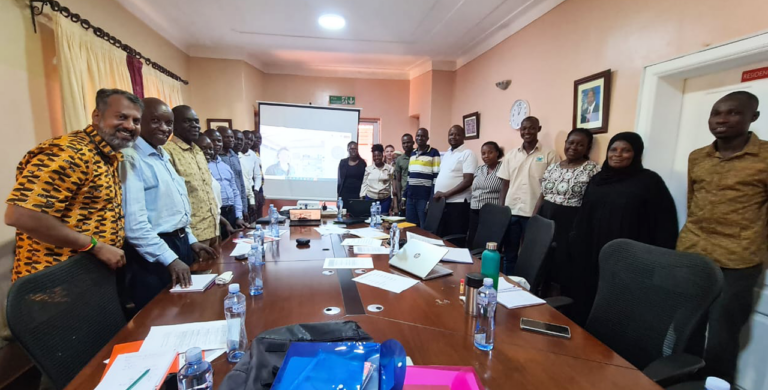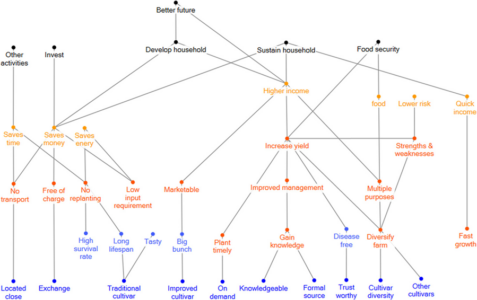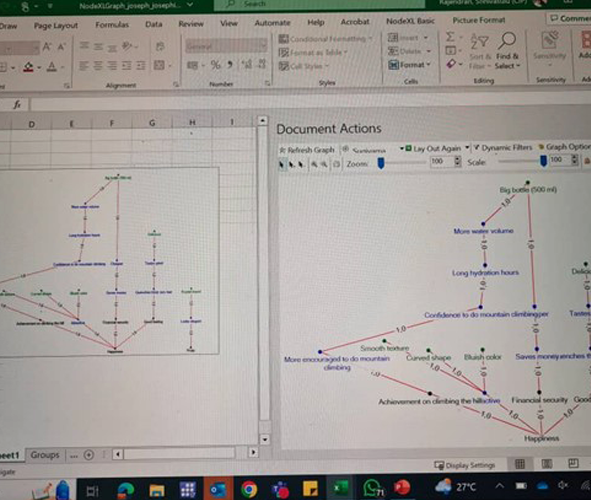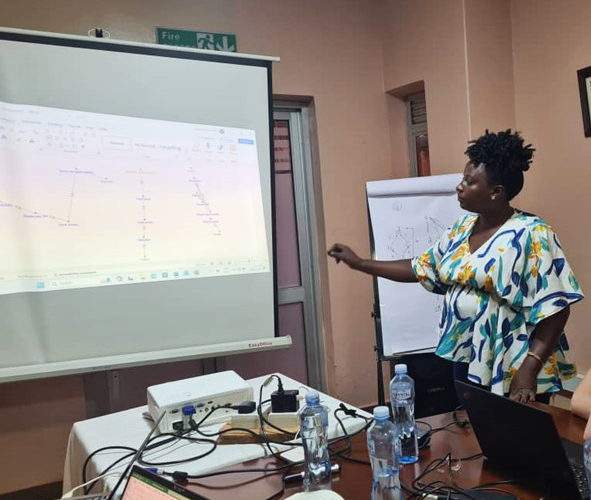The International Potato Center (CIP), through OneCGIAR’s Seed Equal Initiative (Work Packages 3 & 4) and the Program for Seed Systems Innovations for Vegetatively Propagated Crops in Africa (PROSSIVA), collaborated with Wageningen University and Research (WUR) to organize a four-day training program on product design and customer segmentation in Kampala from March 4th to 8th, 2024. The training program involved a highly skilled multidisciplinary team. Approximately 20 researchers and seed entrepreneurs from CIP, The National Crops Resources Research Institute (NaCRRI), and sweetpotato seed producers’ associations actively participated in the training program.

This workshop aimed to develop the skills to design and implement a means-end chain analysis. The means-end chain analysis originates from the field of marketing research and was developed to understand how people evaluate and why they value products and services. Hence, the method is in both the design of products and services and marketing them to different users.
Key strengths of the means-end chain analysis are its non-directiveness and exploratory nature. The method helps researchers understand how other people perceive the world by relating their product knowledge to self-knowledge. Means-End-Chains is one of the tools in the Tools4SeedSystems and has already proven to produce unexpected insights on farmers knowledge and decision making on sources seed of potato in the Andes and Kenya (Urrea-Hernandez et al., 2016, Okello et al., 2018 and Atieno et al., 2023) and banana in Uganda (Kilwinger et al., 2024)
Dr. Ynte van Dam, associate professor at the Marketing and Consumer Behaviour group of WUR, explained the theoretical basis of the method in three online lectures to explain the theoretical basis of the method. Dr. Fleur Kilwinger, a postdoc at the KTI group in WUR, engaged the participants in applying the method in a simulated field setting, practicing the laddering interviewing. Participants practiced the creation of hierarchical value maps with the new version of ‘the MEC analysis tool’,, now available at the Tools4SeedSystems.org website. This tool was designed under the Roots, Tubers and Bananas Research Program and is constantly improved based on users’ experiences under the Seed Equal initiative.
The participants expressed their appreciation for the completeness of the course, and are confident they can now join the planned field study that aims to identify meaningful customer segments and value propositions in the sweetpotato seed business led by Dr. Srini Rajendran later this year and which will inform interventions on preferences for sources of sweetpotato vines for planting and develop appropriate and cost-effective marketing strategies for strengthening sweetpotato seed business in Uganda.

Figure 3. Example of a hierarchical value map created with the MEC Analysis Tool. This hierarchical value map presents the results of a study among banana farmers in Uganda (Source).
Atieno, E. O., Kilwinger, F. B. M., Almekinders, C. J., & Struik, P. C. (2023). How Kenyan potato farmers evaluate the seed: implications for the promotion of certified seed potato. Potato Research, 66(3), 811-829.
Kilwinger, F. B., Marimo, P., Rietveld, A. M., Almekinders, C. J., & van Dam, Y. K. (2020). Not only the seed matters: Farmers’ perceptions of sources for banana planting materials in Uganda. Outlook on Agriculture, 49(2), 119-132.
Okello, J., Zhou, Y., Barker, I., & Schulte-Geldermann, E. (2019). Motivations and mental models associated with smallholder farmers’ adoption of improved agricultural technology: Evidence from use of quality seed potato in Kenya. The European Journal of Development Research, 31, 271-292.
Urrea-Hernandez, C., Almekinders, C. J. M., & Van Dam, Y. K. (2016). Understanding perceptions of potato seed quality among small-scale farmers in Peruvian highlands. NJAS-Wageningen Journal of Life Sciences, 76, 21-28.


